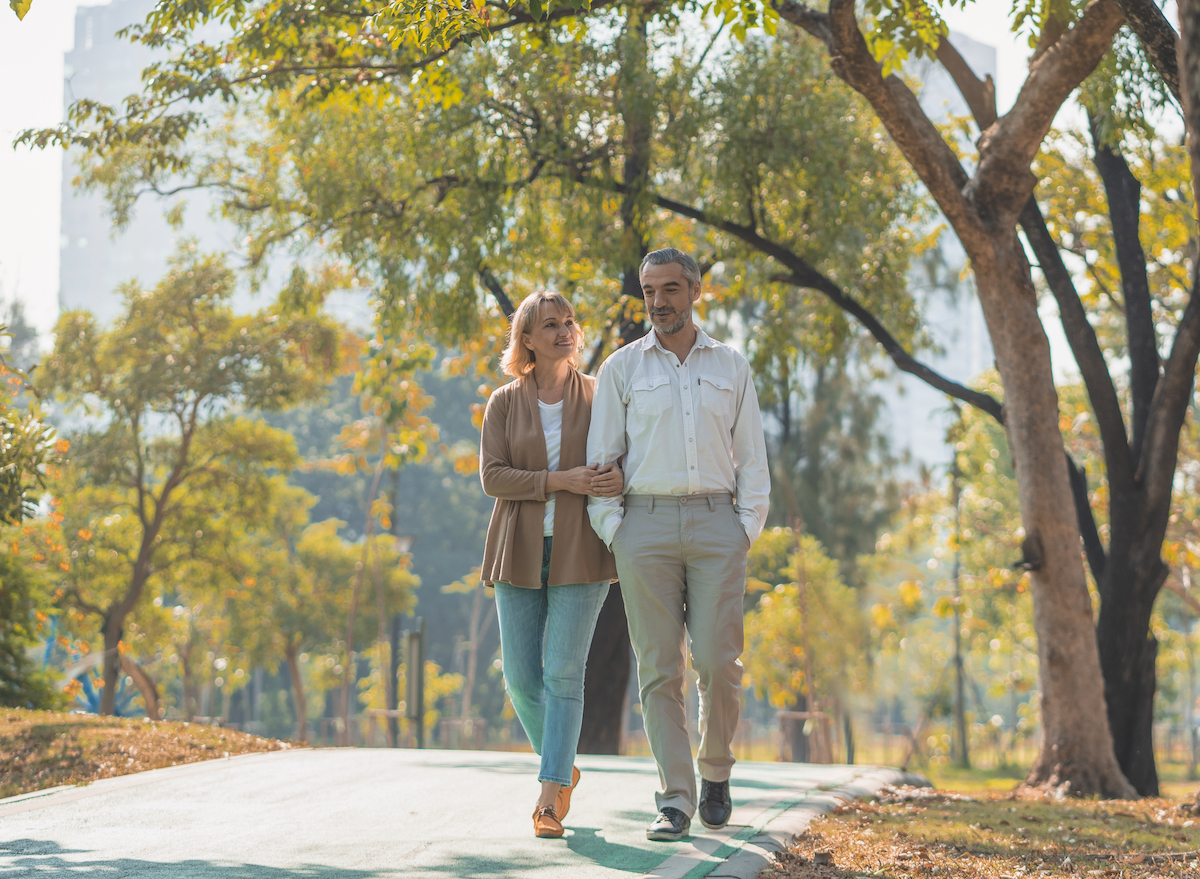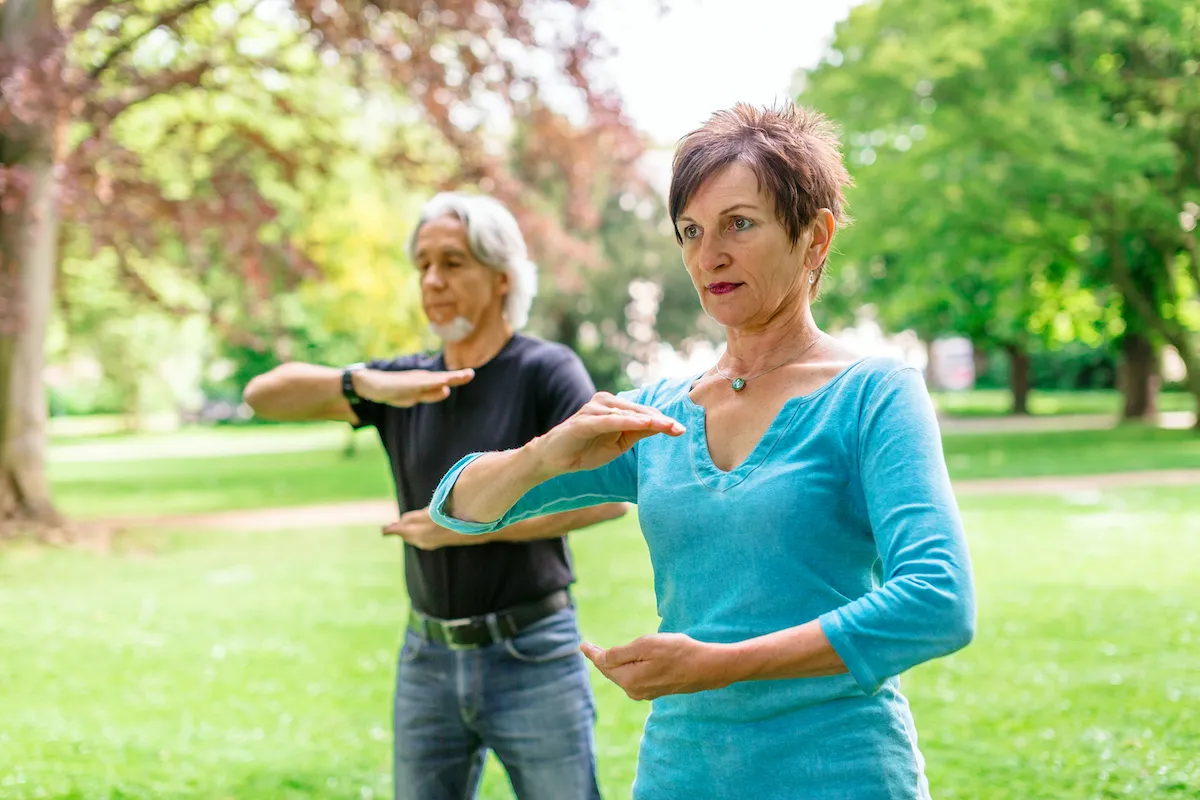Secret Tricks That Make Your Life Better After 60, Says Science

If you think getting older is a total drag, you should think again. Take it from those who are already there. According to a poll conducted by AARP, 67% of participants aged 60 and up are either satisfied or very satisfied with their life—and only 10% consider this period of their life a total bummer.
“The findings of this survey are further confirmation of something a lot of people, especially older people, know instinctively and that is that our upper ages can be great,” AARP CEO Jo Ann Jenkins noted. “However, I think the survey also presents a fairly stark reminder that we’re all faced by a lot of negative associations around aging—some of it’s ‘in the culture,’ and some of it may be self-generated, but it’s all damaging and, as this survey shows, it’s often wrong.”
That being said, 10% is still quite a lot, in our opinion. If you’re among the people over 60 who would like to be happier, healthier, and lead a more energetic and fulsome life, there are a number of lifestyle adjustments and decisions you can apply to your life that will do just that. Read on to learn more about some secret tricks for living a smarter life after 60 that you can start ASAP. And for more healthy living advice for your golden years, don’t miss The Best Exercises for Building Stronger Muscles After 60, Say Experts.
Keep a Small Circle

We all know it’s important to maintain friendships and an active social life. For older adults, though, research suggests that it isn’t so much the quantity of friends one keeps but the quality. One study released in Psychology and Aging finds older adults exhibit higher levels of wellbeing when they keep a small circle of close friends as opposed to a long list of acquaintances. Moreover, older adults with a few close friends actually reported being happier in comparison to younger individuals with a long list of casual pals.
Another research project, this one published in PLOS One, compared the lifestyles of 80+ year olds with incredible cognitive longevity, judged to have the cognitive capacity of a 50-year old, to other 80-year olds deemed cognitively average. One major difference emerged: The cognitively robust participants reported having more close friends.
“You don’t have to be the life of the party, but this study supports the theory that maintaining strong social networks seems to be linked to slower cognitive decline,” comments senior study author Emily Rogalski, an associate professor at Northwestern’s Cognitive Neurology and Alzheimer’s Disease Center. For more great happiness hacks, read about how Spending $5 on This Will Provide You With Instant Happiness, Says Science.
Make Time for More Walks

We’ve already established that many older adults keep a busy schedule. Still, carving out some time each day for a short walk can provide a host of major health benefits. Research published in the American Journal of Preventive Medicine finds that walking briskly for just one hour per week can help prevent and mitigate achy and painful joints, stiff muscles, and arthritis. That works out to just nine minutes of walking per day. A small price to pay for improved mobility and ultimately independence in old age.
“This is less than 10 minutes a day for people to maintain their independence. It’s very doable,” says lead author Dorothy Dunlop, professor of preventive medicine at Northwestern University, in a release. “This minimum threshold may motivate inactive older adults to begin their path toward a physically active lifestyle with the wide range of health benefits promoted by physical activity.” And for more on walking, make sure you’re aware of The One Major Side Effect of Walking More Every Day, According to Science.
Hit the Links (Seriously!)

If you aren’t already an avid golfer, there’s no time like the present to pick up a new putter. Even better, scientists report golfing may actually lower older adults’ overall risk of death. According to the findings, which were presented at a recent American Stroke Association conference, regular golfers over the age of 65 (defined as golfing at least once monthly) had a significantly lower death rate (15.1%) over a 10-year tracking period in comparison to non-golfers (24.6%). Nearly 6,000 older individuals were included in this work.
Why is golfing so beneficial? Researchers theorize it provides a way for older adults to get outside, spend time with friends, and get in some physical activity with a low injury risk.
“While walking and low intensity jogging may be comparable exercise, they lack the competitive excitement of golf,” says lead study author Dr. Adnan Qureshi, a professor of neurology at the University of Missouri in Columbia, Missouri. “Regular exercise, exposure to a less polluted environment and social interactions provided by golf are all positive for health. Another positive is that older adults can continue to play golf, unlike other more strenuous sports such as football, boxing and tennis. Additional positive aspects are stress relief and relaxation, which golf appears better suited for than other sports.” For more reasons to hit the links, see here for the Secret Side Effects of Playing Golf, Says Science.
Practice Tai Chi

The centuries old Chinese martial art Tai Chi may just be the perfect new hobby for older adults to take up in their free time. A study published in the Annals of Internal Medicine reports that practicing Tai Chi for three months is just as effective among older adults at reducing belly fat as traditional forms of exercise.
Tai Chi, often referred to as “meditation in motion,” is also advantageous for older individuals because it helps improve range of motion and balance. Additionally, another research project published in the Journal of Clinical Psychiatry found that three months of Tai Chi helped alleviate depression symptoms among a group of older adults. And for more ways you can feel better instantly, make sure you’re aware of The One Thought You Should Think About When You’re Stressed, According to a New Study.
Exercise in the AM

It may not be a secret that exercise is a good idea, but you may be surprised by just how many benefits exercise can provide for older adults. Consider the findings of this study published in Medicine & Science in Sports & Exercise. Scientists discovered that just a single exercise session improved both working memory skills and cognitive performance immediately afterwards in a group of older adults (ages 60-80).
“One implication of this study is you could think of the benefits day by day,” explains corresponding study author Professor Michelle Voss of the University of Iowa. “In terms of behavioral change and cognitive benefits from physical activity, you can say, ‘I’m just going to be active today. I’ll get a benefit.’ So, you don’t need to think of it like you’re going to train for a marathon to get some sort of optimal peak of performance. You just could work at it day by day to gain those benefits.”
As an added bonus, try and find time for your fitness routine in the morning. This study published in the British Journal of Sports Medicine notes that AM exercise provides older adults with a major cognitive boost throughout the remainder of the day.
Seek Support

Speaking openly about mental health was a taboo for a long time. As such, it makes sense that many older adults who grew up in a much different society are very hesitant to admit it when they’re struggling from a mental health perspective. This is supported by the findings of a recent poll that reports as many as six in 10 older Americans (ages 65+) who believe they’re depressed don’t seek out treatment or support. Another third are waiting to “snap out of it,” and 61% say their issues “aren’t that bad.
An Australian study came to similar conclusions, finding that over 40% of older Australians living with a chronic health condition are unlikely to seek out mental health support—even if they could really use some help.
There’s no reason to suffer in silence in 2021. No matter your age, it’s important to seek out support. “Seniors are not proactively asking for help and, even if psychiatric issues are identified, many refuse treatment due to the stigma surrounding mental health care that is especially prevalent among the older generation,” says Dr. Parikshit Deshmukh, CEO and medical director of Balanced Wellbeing LLC in Oxford, Florida. “There is a misconception that depression is a normal part of aging, but it’s not. And seeking help can not only improve lives, it can even save lives.”